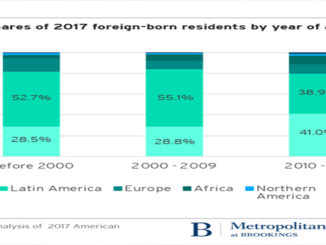
By David Bier
Statement for the Record of the Cato Institute[1]
Submitted to the House Committee on the Judiciary
Markup on
“H.R 2431 – Michael Davis, Jr. and Danny Oliver in Honor of State and Local Law Enforcement Act”
Thursday, May 18, 2017
The Michael Davis, Jr. and Danny Oliver in Honor of State and Local Law Enforcement Act (H.R. 2431) purports to empower states and localities to take action against serious criminals who have violated immigration law.[2] In reality, the bill is a vehicle for a massive expansion of the federal government and of federal power over states and their citizens.
The legislation imposes new mandates on states and uses federal grants to coerce them into following the bidding of the federal authorities. These requirements undermine the federalist system that the Founders intended. Even where it does grant certain state agencies greater powers, it does so while undermining the authority of the state legislatures. It authorizes state and local law enforcement personnel to enforce immigration laws without any authorization from their state legislature to do so and without any training.
The powers that it authorizes will inevitably lead to violations of the civil liberties and privacy of ordinary Americans. Any state official who suspects someone of violating immigration law can demand that they prove their status in the United States and hold them if they fail to do so – all without so much as a request from the federal agencies. It grants states access to federal surveillance databases that include U.S. citizens, compromising Americans’ privacy.
Its provisions that criminalize illegal presence and ordinary status violations would unnecessarily turn millions of peaceful people into criminals and push America further down the road of overcriminalization. This bill would impose billions of dollars in costs on taxpayers with very little benefit.[3]
H.R. 2431 undermines federalism
America’s federalist system of government diffuses power between multiple levels of government. Federalism is each level of government having discretion within their roles and each level respecting the others’ roles. States and localities are responsible for policing communities. The federal government is responsible for the removal of unauthorized individuals. It should not dictate to states how to protect their communities, and states should not be able to dictate to the federal government how to proceed in its removal efforts.
H.R. 2431 ignores both elements of federalism. On the one hand, it allows states to dictate to the federal government how to prioritize the removal of immigrants from the United States. Sec. 102 clearly recognizes this as a federal responsibility, stating that states “may not admit aliens to or remove them from the United States.” Yet Sec. 102 authorizes state law enforcement otherwise to enforce immigration laws “to the same extent as the federal government.” In other words, the only consequence of this provision would be to allow states to dictate to the federal government who it should target first. Indeed, the sponsors of the bill in the 114th Congress made it explicit that the goal of the bill was to overturn federal agency priorities for enforcement.[4]
These provisions undercut the authority of Congress, which repeatedly emphasized in each Department of Homeland Security (DHS) appropriation that the department “shall prioritize the identification and removal of aliens convicted of a crime by the severity of that crime.”[5] They could also interfere with DHS removal operations that states and localities are unaware of, even compromising investigations. DHS has access to a broader range of intelligence in all 50 states and internationally regarding the best use of its resources. Yet Sec. 108 requires DHS to “schedule for the prompt transfer of apprehended aliens from the custody of States.”
On the other hand, the bill purports to empower states and localities, but the main thrust of the bill is the opposite—it requires states to participate in federal enforcement operations against their wishes. Indeed, Sec. 114 states unequivocally that states and municipalities cannot create policies that decline to cooperate fully in the enforcement of federal immigration law (p. 25). It goes on to ban policies that restrict state and local law enforcement from reporting unauthorized immigrants to federal authorities. These mandates are unfunded. In these ways, it eliminates the discretion of state and local law enforcement regarding their policing priorities in their own local communities.
The bill also uses federal grants to bully states into doing the will of Congress. Sec. 114 conditions any federal grant “that is substantially related to law enforcement, terrorism, national security, or immigration or naturalization” on compliance with these new unfunded requirements. Sec. 115 conditions these same grants on cooperation with federal requests to detain immigrants on its behalf. If the federal government does subsidize states, it should do so without strong-arming them into its priorities.
Courts could see these mandates as “commandeering” a state into enacting a federal program, which would be unconstitutional.[6] The spending provisions also flirt with unconstitutional coercion of states by threatening to withdraw potentially large sums of law enforcement funds.[7] Congress should not push the constitutional limits of federal intrusion into state policy decisions. Yet the bill manages to undercut this vision in both directions—allowing states to impose on the federal government and the federal government to impose on the states.
Sec. 106 also creates new grant programs to state and local governments “for procurement of equipment, technology, facilities, and other products that facilitate and are directly related to” immigration enforcement. These subsidies also undermine federalism by removing local accountability for spending that occurs at that level. At the same time, the federal government has no real means to guarantee that the grants actually result in additional state enforcement as opposed to allowing the state to shift law enforcement funds to other purposes.
H.R. 2431 undermines democracy and obstructs accountability
Even when the bill explicitly expands the authorities of state law enforcement, it undermines the authority of state legislatures, thereby undercutting democratic oversight. Sec. 102 authorizes state law enforcement to “investigate, identify, apprehend, arrest, detain, or transfer to Federal custody aliens for the purposes of enforcing immigration laws of the United States to the same extent as Federal law enforcement personnel.” It has no requirement that state legislatures have to authorize this enforcement to take place, meaning that any local officer may—on their own—begin arresting people that he believes to have violated immigration laws.
Reinforcing this provision, the bill immunizes any local officer who chooses to make these arrests, stating that they are acting under federal authority. This severely curtails the ability of the state to regulate this behavior. State legislatures may want to adopt policies different from certain members of their police forces that they believe will better protect their communities than targeting immigrants for removal. The bill does not even require that the head of the law enforcement agency create the enforcement policy and guidelines for the state, meaning that literally any police officer could begin to make arrests and detentions of individuals with federal qualified immunity.
These provisions are even more problematic because the bill imposes no training requirements on police prior to allowing them to conduct enforcement. Yet Sec. 109 states that nothing in it “shall be construed as making any immigration-related training a requirement for, or prerequisite to, any State or local law enforcement officer to assist in the enforcement of Federal immigration laws.” This means that the hundreds of thousands of police officers in America could make arrests without any training at all, and their state legislatures would actually be banned from preventing them from such arrests under Sec. 114 if the officer was “cooperating with Federal law enforcement entities.”
The legislation is not even consistent on this point. Sec. 112 makes various changes to the 287(g) program—which currently allows state and local police to make immigration arrests with a formal agreement between federal and state authorities—but the changes do not remove the program’s requirement that police must undergo training. Thus, in one section of the bill, the assumption is that local law enforcement need no training, while in another section, it assumes that they do.
H.R. 2431 establishes a situation in which any law enforcement officer in America can independently arrest and detain people he believes have violated any aspect of immigration law, including arcane labor regulations. Not only are state legislatures prohibited from stopping this situation from happening, they are subject to monetary penalties if they try. It is almost impossible to imagine a bill more directly intended to prevent state governments from controlling their own law enforcement personnel.
H.R. 2431 creates an unworkable enforcement system
State and local cooperation with ICE makes sense in certain contexts. Both states and the federal government have an unquestionable interest in removing criminal aliens. This cooperation already happens on a regular basis. H.R. 2431 encourages states to make arrests of any alien in violation of immigration laws without agreement or even consultation with ICE. But the determination of removability and admissibility are the results of a federal removal process. For example, immigrants in removal proceedings may present evidence of eligibility for status or relief before an Immigration Judge who can evaluate this evidence. No technology can provide states the ability to make a removability determination on their own.
Sec. 102 itself makes clear that removability and admissibility are federal determinations, yet Sec. 102(a) and Sec. 108 allow states and localities to hold people and criminally prosecute them for supposed violations of immigration law prior to turning them over to the federal government. Even if a state could determine a person’s status reliably without cooperation from the federal government, individuals who currently lack status in the United States may be eligible for status or forms of relief, including asylum, withholding of removal, or even a green card. Yet once again, Sec. 102(b) makes clear any determination to admit an alien is a federal decision, so states cannot come to these conclusions.
The final result of H.R. 2431 would be states and localities across the country making arrests and detention of individuals based on uncertain information. Sec. 102 apparently grants them completely unfettered discretion to detain a person indefinitely until ICE can respond. ICE would then be forced to respond to thousands of requests, attempting to determine ex post facto whether the person is, in fact, an unauthorized immigrant and a priority for removal. Rather than ICE setting priorities, and working with localities to carry them out, H.R. 2431 allows states to set priorities and forces ICE to respond. The bill would certainly result in many arrests that ICE would decline to prosecute, purposelessly taking up its finite resources.
It is not clear that the ICE union, which has strongly supported earlier versions of this legislation, even favors this idea. In June 2013, ICE union head Chris Crane testified in favor of a prior version of this bill, listing a dozen provisions that he felt would improve security but never mentioned state and local arrests without ICE support.[8]
H.R. 2431 threatens the privacy and civil liberties of Americans
Allowing every single law enforcement officers in the country discretion to enforce immigration laws without any training or federal oversight would inevitably result in violations of the civil liberties of Americans. In 2010, the Department of Homeland Security’s Inspector General (DHS IG) concluded that under ICE’s 287(g) agreements—which currently permit state and local law enforcement to conduct immigration enforcement in cooperation with and an agreement with the federal government—many law enforcement agencies were not complying with the terms of those agreements and “civil liberties considerations are not consistently weighed in the 287(g) application review and selection process.”[9]
It listed several instances of 287(g) abuses, including the detention of a U.S. citizen by a 287(g) local officer.[10] Several 287(g) agreement holders have had their agreements revoked after they engage in a pattern of wrongful stops of U.S. citizens.[11] In December 2011, the Department of Justice (DOJ) concluded that under 287(g), Maricopa County in Arizona engaged “in a pattern or practice of unconstitutional policing.”[12] A federal district court also found that Maricopa County violated its citizens’ constitutional rights during immigration enforcement.[13] In September 2012, DOJ found that Alamance County in North Carolina similarly engaged in “a pattern or practice of violations of the United States Constitution and federal law” under the authority of 287(g).[14] In 2012, DHS responded to the 287(g) problems by dramatically limiting the authority of 287(g) officers, banning them from exercising their authority outside of jails.[15]
As mentioned earlier, H.R. 2431 allows states and localities to arrest individuals without a request from DHS. This is particularly troubling given the number of people who have been subject to wrongful detention by state and local police even with a request from DHS. Allentown and Lehigh County, Pennsylvania, for example, settled with a U.S. citizen who was wrongfully detained as an unauthorized immigrant.[16] Clackamas County, Oregon, settled a case after it detained a woman for 14 days based on an ICE request.[17] Salt Lake County, Utah settled a case after they detained a person for a month and a half for ICE.[18] One U.S. citizen in Rhode Island was subject to wrongful detention by state police twice due to ICE mistakes.[19]
During the course of the Rhode Island lawsuit, the Rhode Island Department of Corrections found that from 2003 to 2014, ICE issued detainers for 462 people who state police found were U.S. citizens.[20] ICE only issued 5,215 total detainers to agencies in the state, meaning that almost 10 percent of the detainers in Rhode Island were for U.S. citizens.[21] It is hard to believe that Rhode Island, with a low proportion of immigrants and Hispanics generally, has a higher share of wrongful detentions than other states. If this rate held nationally, 167,302 U.S. citizens have been subject to an ICE detainer since 2003.[22] H.R. 2431 extends the detainer power to untrained state and local law enforcement to reach conclusions of probable cause of immigration violations. This would increase the risk of wrongful detention of Americans considerably.
Under 287(g) agreements, local or state officers must undergo some training prior to acting as an immigration agent, yet the DHS IG found that “287(g) training does not fully prepare officers for immigration enforcement duties.”[23] H.R. 2431 requires no training at all, so any problems will surely grow.
Sec. 104 grants states access to all “Federal programs or technology directed broadly at identifying inadmissible or deportable aliens.” The most common program is ICE’s Investigative Case Management (ICM) system, which creates profiles of any individual by accessing a variety of law enforcement databases. It “can provide ICE agents access to information on a subject’s schooling, family relationships, employment information, phone records, immigration history, foreign exchange program status, personal connections, biometric traits, criminal records, and home and work addresses.”[24] This database includes U.S. citizens, as it must in order to eliminate them from further investigation. All of this information gathered, pursuant to many different authorities, could be used by any untrained law enforcement agency in the country for virtually any reason under H.R. 2431, compromising the privacy of every single American.
H.R. 2431 unnecessarily criminalizes nonviolent people
Sec. 314 criminalizes any violation of immigration law no matter how minor, including overstaying a visa by a single day or accepting $10 to mow someone’s lawn without employment authorization. Overnight, it would turn roughly 4 million unauthorized immigrants who have overstayed their visas into criminals.[25] On an ongoing basis, it would criminalize the 416,000 tourists—mainly from Europe and Canada—who overstay their visa from any period each year.[26] The sponsors in prior years have claimed that the bill would reduce the number of “criminal” aliens, but in reality, it would massively increase their numbers without any clear purpose.[27]
The sponsors fail to tout the benefits of this proposal, and the Committee report on the prior version of the bill from 2013 justifies this provision solely as a reaction to a single district court decision.[28] The U.S. District Court for the District of Arizona enjoined the immigration enforcement of efforts of Maricopa County, which had its 287(g) agreement terminated (as noted earlier). It stated that the county’s ‘‘focus on removable alien as opposed to aliens who have committed criminal offenses violates the strictures against unreasonable seizures set forth in the Fourth Amendment.’’[29] The Committee report concludes the only way to allow states to enforce immigration laws would be to criminalize all violations of immigration law.
Yet this reading of the decision is incorrect. The Court stated:
The deputy cannot prolong the stop to investigate a passenger unless the deputy through his or her observations obtains particularized reasonable suspicion that the passenger is committing a violation that the deputy is authorized to enforce. In such cases, the deputy is only allowed to prolong the stop for the brief time sufficient to investigate the existence of the crime. When the [county] deputies were 287(g) authorized, that authority presumably extended to include administrative and hence non-criminal violations of federal immigration law. Such authority, however, no longer exists.[30]
In other words, the district court held that when the county had authorization from the federal government, they had the authority to detain individuals to investigate violations of immigration law. Only after DHS revoked this authority did the county lose the ability to detain and investigate civil immigration violations.
Thus, even assuming that authorizing states and localities to conduct immigration raids is appropriate, this district court decision is not a legitimate justification for criminalizing all aspects of immigration law. Sec. 102 clearly provides authorization for localities to conduct enforcement of civil violations, and that would suffice to resolve the court’s concern.
Immigration offenses are already the top reason for a criminal arrest under federal law, composing half of all arrests.[31] This bill could dramatically increase the number of these offenders. Such a focus on nonviolent offenses demonstrates misplaced priorities. Law enforcement should target individuals who are threats to their community, and the federal government should save prison space for similarly dangerous people. In other contexts, the Committee has endeavored to prevent further overcriminalization of nonviolent people, and it should apply those lessons here.[32]
[1] The Cato Institute is a libertarian 501(c)(3) nonprofit think tank founded in 1977 and located in Washington D.C.
[2] “Michael Davis, Jr. and Danny Oliver in Honor of State and Local Law Enforcement Act,” https://judiciary.house.gov/wp-content/uploads/2017/05/Michael-Davis-Jr….
[3] The Congressional Budget Office estimated that an earlier version of the legislation would cost $22.9 billion over 5 years. Congressional Budget Office, “H.R. 2278 Strengthen and Fortify Enforcement Act,” December 5, 2013, https://www.cbo.gov/sites/default/files/113th-congress-2013-2014/costest….
[4] House Judiciary Committee, “The Michael Davis, Jr. in Honor of State and Local Law Enforcement Act Rep. Trey Gowdy (R-S.C.) – Summary.” https://judiciary.house.gov/wp-content/uploads/2016/03/interior-enforcem….
[5] “H.R.2029 – Consolidated Appropriations Act, 2016,” https://www.congress.gov/bill/114th-congress/house-bill/2029/text.
[6] The Supreme Court has held that Congress “may neither issue directives requiring the States to address particular problems, nor command the States’ officers” (Printz v. United States, 521 U.S. 898 (1997)). Moreover, it has held that “Congress may not commandeer the States’ legislative processes,” and the “Constitution does not confer upon Congress the ability simply to compel the States” (New York v. United States, 505 U.S. 144 (1992)).
[7] In NFIB v. Sebelius, 567 U.S. 1 (2012), the Court held that the Affordable Care Act coerced states by denying those that didn’t establish health care exchanges all of their federal Medicaid funding. “Permitting the Federal Government to force the States to implement a federal program would threaten the political accountability key to our federal system,” it wrote. “Spending Clause programs do not pose this danger only when a State has a legitimate choice whether to accept the federal conditions in exchange for federal funds.”
[8] Comments of Chris Crane, “Hearing on Strengthen and Fortify Enforcement (SAFE) Act,” the Committee on the Judiciary House of Representatives, June 13, 2013, https://www.gpo.gov/fdsys/pkg/CHRG-113hhrg81463/pdf/CHRG-113hhrg81463.pdf.
[9] Department of Homeland Security Office of Inspector General, “The Performance of 287(g) Agreements,” March 2010. https://www.oig.dhs.gov/assets/Mgmt/OIG_10-63_Mar10.pdf.
[10] Ibid.
[11] Jeremy Duda, “Homeland Security revokes 287(g) agreements in Arizona,” Arizona Capitol Times, June 25, 2012. http://azcapitoltimes.com/news/2012/06/25/homeland-security-revokes-287g….
[12] Thomas Perez, “Re: United States’ Investigation of the Alamance County Sheriff’s Office,” U.S. Department of Justice, Civil Rights Division, December 15, 2011, https://www.justice.gov/sites/default/files/crt/legacy/2011/12/15/mcso_f….
[13]Manuel de Jesus Ortega Melendres et al. v. Joseph M. Arpaio, U.S. District Court for the District of Arizona (May 24, 2013) (No. PHX-CV-07-02513), https://www.aclu.org/sites/default/files/field_document/arpaio_decision.pdf.
[14] Thomas Perez, “Re: United States’ Investigation of the Alamance County Sheriff’s Office,” U.S. Department of Justice, Civil Rights Division, September 18, 2012, https://www.justice.gov/iso/opa/resources/171201291812462488198.pdf.
[15] Ted Hesson, “As One Immigration Enforcement Program Fades Away, Another Rises,” ABC News, December 27, 2012, http://abcnews.go.com/ABC_Univision/News/immigration-enforcement-program…
[16] American Civil Liberties Union of Pennsylvania, “Galarza v. Szalczyk, et al.,” available at https://www.aclupa.org/our-work/legal/legaldocket/galarzavszalczyketal/
[17] Steve Mayes, “Woman at center of landmark immigration case settles suit that changed jail holds in state, nation,” The Oregonian, May 18, 2015, available at http://www.oregonlive.com/clackamascounty/index.ssf/2015/05/woman_at_cen…. ↩
[18] Ashton Edwards, “Man settles immigration lawsuit against Salt Lake County, awarded $75,000,” Fox 13 News, August 25, 2014, available at http://fox13now.com/2014/08/25/man-settles-immigration-lawsuit-against-s….
[19] American Civil Liberties Union Rhode Island, “Court Filings Show Immigration Officials Issue Detainers Against U.S. Citizens,” November 17, 2015, http://www.riaclu.org/news/post/court-filings-show-immigration-officials….
[20] Ibid.
[21] TracImmigration, “Tracking Immigration and Customs Enforcement Detainers,” Syracuse University, http://trac.syr.edu/phptools/immigration/detain/.
[22] Ibid.
[23] Ibid, p. 27.
[24] Quoted in: Matthew Feeney, “Big Data Tool For Trump’s Big Government Immigration Plans,” Cato Institute, May 9, 2017, https://www.cato.org/blog/big-data-tools-trumps-big-government-immigrati….
[25] “Modes of Entry for the Unauthorized Migrant Population,” Pew Research Center, May 22, 2006, http://www.pewhispanic.org/2006/05/22/modes-of-entry-for-the-unauthorize….
[26] Jeffrey Passel and D’Vera Cohn, “Homeland Security produces first estimate of foreign visitors to U.S. who overstay deadline to leave,” Pew Research Center, February 3, 2016. http://www.pewresearch.org/fact-tank/2016/02/03/homeland-security-produc…
[27] House Judiciary Committee, “The Michael Davis, Jr. in Honor of State and Local Law Enforcement Act Rep. Trey Gowdy (R-S.C.) – Summary.” https://judiciary.house.gov/wp-content/uploads/2016/03/interior-enforcem…
[28] Bob Goodlatte, “Strengthen and Fortify Enforcement Act – House Report 113-678 Part 1,” House of Representatives, December 16, 2014, https://www.congress.gov/113/crpt/hrpt678/CRPT-113hrpt678-pt1.pdf.
[29]Melendres v. Arpaio, (D. Ariz.) (2013 WL 2297173).
[30] Ibid, p. 132.
[31] John Gramlich and Kristen Bialik, “Immigration offenses make up a growing share of federal arrests,” Pew Research Center, April 10, 2017. http://www.pewresearch.org/fact-tank/2017/04/10/immigration-offenses-mak…
[32] House Judiciary Committee, “Press Release – House Judiciary Committee Reauthorizes Bipartisan Over-Criminalization Task Force,” February 5, 2014, https://judiciary.house.gov/press-release/house-judiciary-committee-reau….



